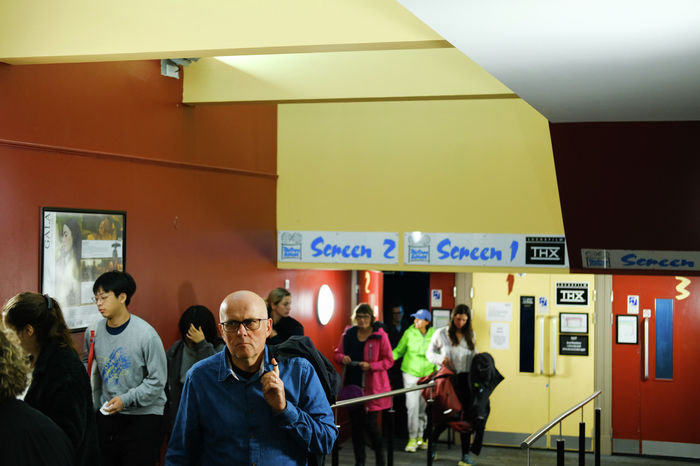Living through horror with Hoard
Cambridge Film Festival: Eve O’Donoghue finds Luna Carmoon’s debut horror, Hoard, a brutal reflection of what it is to be human

Upon its release in 1848, critics condemned Emily Brontë’s Wuthering Heights as depraved, vulgar and brutal. These words and their synonyms echo in the reviews of Luna Carmoon’s debut feature, Hoard. The film is an assaulting and abrasive sensory experience which refuses to turn away from the ugliness of unrestrained human emotion. Carmoon stages an unconventional coming-of-age story in the scraps and debris of modern materialism. Maria (portrayed by both Lily-Beau Leach and Saura Lightfoot Leon) grows up with a deeply devoted mother, Cynthia (Hayley Squires), in a home full of what Cynthia calls their “catalogue of love” – discarded scraps salvaged from bins and landfills by the duo, evidence of Cynthia’s out of control obsession.
“Waste, like grief, like anger, like raw sexuality and imperfect love, makes up the dark underbelly of what it is to be human”
But Maria can’t stay here forever and, after an inevitable tragedy, she must leave her mother’s nest to be taken in by the kind and attentive Michelle (Samantha Spiro), who seeks to provide her with a healthy, nurturing environment. However, the emotional pile-up of Maria’s early life avalanches out of control through her separation from a close friend and the arrival of a fellow rascal and twin flame, Michael (portrayed by Stranger Things’ Joseph Quinn). Hoard follows Maria into an all-too-familiar descent through the madness of love and grief, laying bare all of the sickness, decay and horror that lurks closely to all human experience. Grabbing four prizes at Venice Film Festival, Carmoon’s debut has received resounding critical acclaim, despite being an uncomfortable viewing experience for those expecting a “nicer” coming-of-age story.
Carmoon employs a gorgeous and ostentatious materialism in her sets and cinematography, dancing between ornamental beauty and cluttered, heaving mess. What is horrific in Hoard is not the supernatural or the outright evil, but the unapologetic magnification of the everyday horror of waste and death. Carmoon plays on COVID-enhanced phobias, like claustrophobia and fears of contamination, culminating in a psychological horror which is bound tightly to the true horror of a planet becoming submerged by rubbish.
“A psychological horror which is bound tightly to the true horror of a planet becoming submerged by rubbish”
Primarily a psychological horror, as the audience falls with Maria into the depths of grief and obsession, the film also taps into a deep-seated and relatable environmental terror as it depicts a landscape of encroaching disease and overwhelming clutter. Carmoon paints a distinctly modern and relevant landscape of horror: the debris-ridden reality of landfills and pollution that we all inhabit but must continue to love and grow within. Perhaps the true madness the film highlights is the delusion of distancing ourselves from the waste we spend our lives scurrying through. Waste, like grief, like anger, like raw sexuality and imperfect love, makes up the dark underbelly of what it is to be human.

Hoard asserts itself as a truly paramount coming-of-age film, drawing on an almost archaic gothic format that has more in common with the likes of Jane Eyre than it does with other justly esteemed films about female maturity. The gothic elements are all there: Quinn’s Michael as a less formidable but equally provoking Heathcliffe, and Spiro’s Michelle as a grounding force equal to Mrs. Fairfax. Hoard illustrates a maturation which necessitates walking through the darkest parts of humanity in order to understand ourselves and others, and to choose optimism and care in spite of the prevalence of real horror. This classic structure, which corsets Hoard, draws together its modern aesthetic and highly-developed characterisation with a story reminiscent of any Brontë sister or Edgar Allen Poe.
“I can smell a memory”, Maria muses during the course of the film. The innate and childlike humanity of Hoard journeys the spectator through an all-encompassing experience of love and madness. Carmoon expertly creates a film which triggers every human sense the cinema possibly can. The touching and terrifying tale is felt profoundly through the explicit and unrelenting mise-en-scene, and phenomenal performances overall. Hoard is entirely horrific, challenging, spellbinding and enchanting.
 News / Uni Scout and Guide Club affirms trans inclusion 12 December 2025
News / Uni Scout and Guide Club affirms trans inclusion 12 December 2025 News / Pembroke to convert listed office building into accom9 December 2025
News / Pembroke to convert listed office building into accom9 December 2025 Features / Searching for community in queer Cambridge10 December 2025
Features / Searching for community in queer Cambridge10 December 2025 News / Uni redundancy consultation ‘falls short of legal duties’, unions say6 December 2025
News / Uni redundancy consultation ‘falls short of legal duties’, unions say6 December 2025 News / Gov declares £31m bus investment for Cambridge8 December 2025
News / Gov declares £31m bus investment for Cambridge8 December 2025









